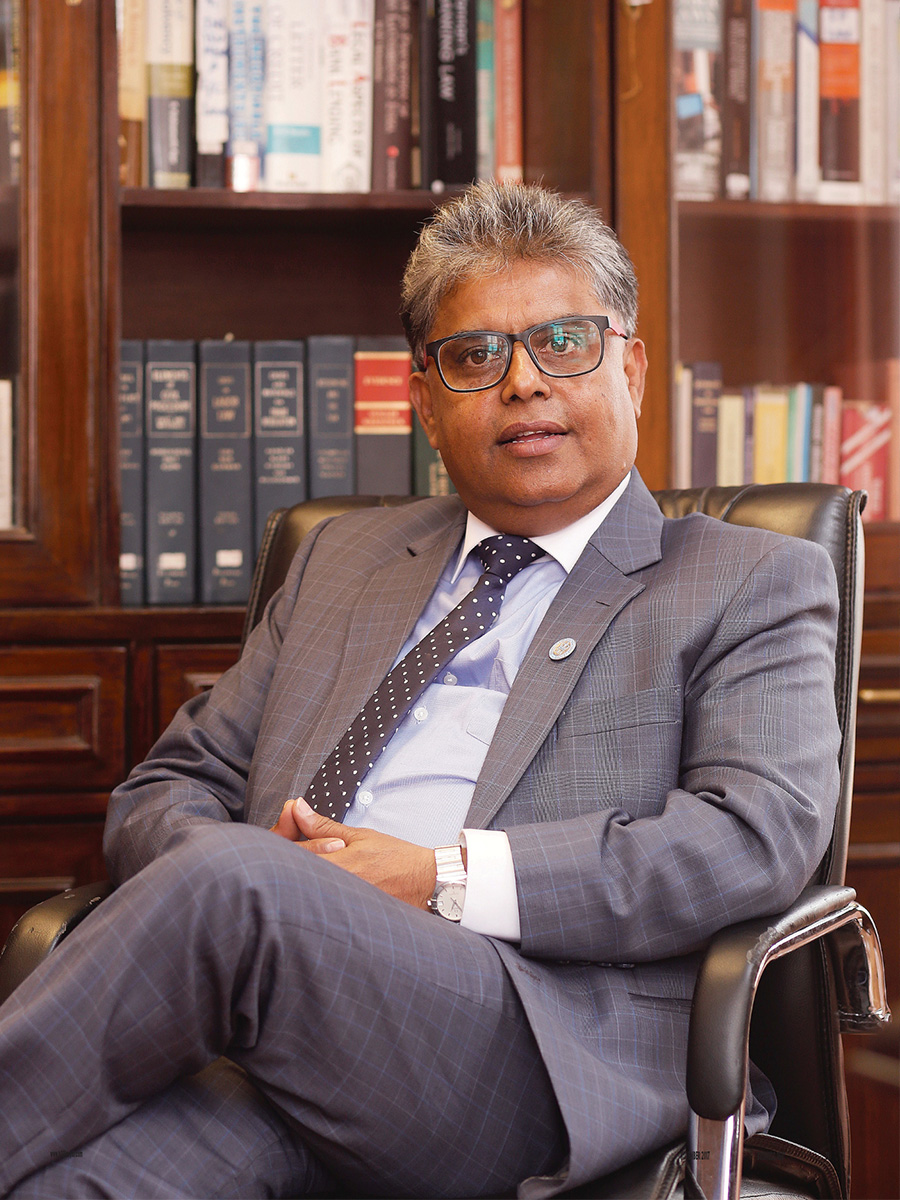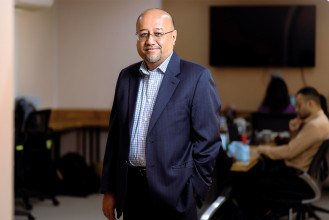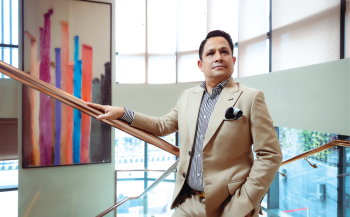
Text: Sujan Tiwari
“Without good legal practices, we cannot expect foreign investment, and without good foreign investment, we can’t expect economic development of the country,” says Gandhi Pandit, Corporate Lawyer and Founding Partner of Gandhi and Associates. “Nepalis are accustomed to doing business in a rather unprofessional manner, by overlooking existing laws and legalities. They prefer to fight a case later than fulfil the legalities beforehand, so they usually get into trouble. On the contrary, when foreigners do business, they scrupulously follow all legal procedures so that there is no complication later on,” explains Gandhi. According to him, this is the good practice that most Nepali businessmen lack, telling us them that this is where they step in, “We help our clients in this regard; we fulfil all the legalities required for businesses so that there are no problems later”. “We also help the government expand its legal areas, to improve existing laws to attract more foreign investment that in turn generates more employment, more income and ultimately a better economy,” he says. Pandit says that existing laws are good in Nepal, but implementation is very weak, and the worst is the inconsistency in law and policies. “There should be a robust implementation mechanism and timely amendments of laws. A lot of obsolete laws and policies are not scrapped; the government should form a committee to look into it. Moreover, there is no clarity in laws and policies and a lot of dualities exist, making Nepal a risky area for investment,” says Pandit, who is also Associate Professor of Law at Nepal Law Campus.
Childhood and Education
Pandit was born in Tanahun in 1958 to Late Bam Dev Pandit and Dev Kumari Pandit. His father was a poet, an active politician and a Bichari, a judge during the Rana regime. His father named him Gandhi as he was deeply influenced by Mahatma Gandhi. “This name has helped me a lot throughout my life. Everyone I meet always remembers me as it is a very distinct name,” says Pandit. He grew up in Chitwan in a remote village. His father was particular about his children getting a good education. So he went to Chitwan High School as a child. “I was very influenced by my father’s job as a judge, and I wanted to be a lawyer although I didn’t know at that time what this profession entailed. I also used to argue a lot, so people used to tell me that I should become a lawyer,” recalls Pandit. Pandit came to Kathmandu in 1975 after he completed his SLC. He had no other aim than becoming a lawyer. Here he found his peers opting for studies in Medicine and Engineering and he too decided to give it a shot. Unfortunately he failed the entrance exams, and thus returned to his original dream. He then tried joining a five year diploma in law at the Nepal Law Campus. Ironically he failed the entrance for this too. “I was in the first batch when the new education system was implemented and the course of study was changed. In the entrance, they had asked questions from the old course, so I decided to go and talk to campus chief about it,” he recalls. He presented his case so well to the campus chief that he earned himself a place in the college. There were 150 students in his class and he was always among the top five. After completing the course, he wanted to study further rather than start practice. In those days, only a handful of people were doing LLM, the Master’s degree in Law. He went with four other friends to India to pursue the degree from Delhi University but they found it tough with language becoming a barrier. “I had to work very hard to get through the course. I used to study for 16 hours a day. And I read everything I could find on law. It was a two years course and it took me two and half years to complete it. Only two of us made it through,” says Pandit. In college, he was interested in jurisprudence, commercial and company law, and constitutional law, and also became politically active. After completing his LLM in India, Pandit returned to Nepal and worked as an intern with a law firm for a year. He also started teaching at the Nepal Law Campus. [caption id="attachment_4963" align="alignnone" width="1100"] GANDHI PANDIT / Founding Partner, Gandhi and Associates[/caption]
Early Years
When he decided to open his own office, he didn’t have the funding for it. “I needed Rs 4,000 to buy furniture but I couldn’t manage the amount. I was married by that time, so my wife gave me some of her gold ornaments to get a loan from the bank. With that loan, I opened my first office,” recalls Pandit on an emotional note. Pandit was new in the market and didn’t get any a single case for three months. But with time, he gained trust and popularity owing to his skills and good practices. “Within three years of establishing my firm, I was a popular name. I started getting a lot of cases, most of which I always won,” he says. In 1989, Pandit was in the University of Wisconsin, Madison to attend an annual summer program to introduce the American legal system to foreign lawyers. He also had a few friends in USA who were studying and practicing law in New York, so he went there to meet them. “A friend of mine took me to visit Columbia University. I was very excited. There I was introduced to a professor who also happened to be the Chairman of the LLM Admission Committee. He asked me a few questions, and I told him about my achievements,” he recalls. Pandit was only around 30 years old at that time, and the professor was deeply impressed by him. To his surprise, the professor offered him admission to study law at Columbia University with 60 percent scholarship and without applying or any formalities. Pandit returned to Nepal as the admission was scheduled for the next year. It was at the time when the Movement of 1990 started in Nepal. Pandit was actively associated with Nepali Congress. He was highly successful and confused whether he should go to Columbia or not. “I consulted with late Prime Minister Girija Prasad Koirala as he was very close to me. He told me not to go as democracy had just been reinstated and there was a lot to do here. Again, I consulted Krishna Prasad Bhattarai who advised me to go and study. He said that I could join politics any time, but I won’t get this opportunity again,” shares Pandit. Pandit believes that going to Columbia University for his second Masters degree in Law was the best decision of his life. “I struggled a lot as New York was very expensive and I barely survived there. Still it was worth it as the University provided me with tremendous exposure apart from the education. I got a chance to work and interact with lawyers from all around the world. I built self-confidence and was ready to take on any challenge,” he says. Pandit specialised in Banking and Commercial Law, and after completing his degree, he practiced in the USA as a foreign law associate with a legal firm. He learnt a great deal about corporate law, dealing with clients, making agreements, and received a lot of legal exposure through his practice in USA. Then in 1997, Pandit returned to Nepal.
Founding Gandhi and Associates
After returning to Nepal, Pandit thought of continuing his practice, but he wanted to start a corporate law firm instead of a traditional one as before. He had some money which he spent on the new office. “What I started was probably the first corporate law firm in Nepal. I started providing services and practices like reviewing and drafting agreements, company compliances, litigations, and all other services that clients needed. I hired a few lawyers, bought computers and furniture, and started a professional law firm. This was in 1997,” recalls Pandit. And this was how the foundation of Gandhi and Associates was laid two decades ago.
Present day
“People were laughing at me when I started Gandhi and Associates. They thought I was a fool spending money on hiring lawyers and office infrastructure. But slowly I started getting cases that matched my firm’s expertise. Big names like Nepal Bank Limited and Garud Air were two of my first clients,” remembers Pandit. Today, Gandhi and Associates, is a leading law office hiring more than 30 lawyers who specialise in making and reviewing agreements, litigation, company compliances and foreign investment. The firm is recognised as one of the largest corporate law offices in Nepal and offers legal services like registering company, legal auditing, taxes, solving labour issues, land acquisition, repatriation, share transfers and agreements, etc. “Gandhi and Associates provides a one-stop service related to legal and procedural services required by businesses and companies,” says Pandit. Gandhi and Associates has its offices in Pokhara and Butwal as well. Gandhi’s legal practice is focused in the area of corporate transaction law, sales, banking, and insurance law. He has provided frequent domestic legal assistance to international consulting teams, including projects related to the Hetauda-Kathmandu Fast Track Road and the establishment of the National Judicial Academy. Gandhi is also the legal consultant for Larsen and Toubro, Sinohydro-Sagarmatha Power and many other big companies. He also worked as a legal consultant for the World Bank in Cross Border Transmission Line project to build transmission lines between India and Nepal. According to him, his firm has represented transactions worth six billion dollars till today. [caption id="attachment_4962" align="alignnone" width="1200"] GANDHI PANDIT / Founding Partner, Gandhi and Associates[/caption]
Personal side
Pandit says he is a family man and loves to spend time with his wife Meena and two sons Shikhar and Avash. Both his sons are lawyers and working with him. His hobbies are playing golf and driving. Whenever free, he likes to go on long drives with his family. He owns a Rexton, Verna and Datsun. He is currently doing his PhD on Bank Guarantee, and is working on his thesis. Pandit doesn’t socialise much, preferring to spend time with family and work.
Advice
Pandit encourages the new generation to study law as it is becoming a very lucrative profession. “The legal profession is growing and offers big scope. It is not traditional anymore. It is evolving as a business. It can help society and the nation,” says Pandit. He says that there is immense opportunity for everyone in Nepal to do well in their respective fields. According to him, hard work and patience are essential to success. “The young generation lacks patience, they want success fast and quick and that is not the way. Steady growth is the key to success and it only comes through patience and focussed hard work,” he says. According to him, Nepal can develop in a very short time, but there is need for good government. He advocates reforms in regulatory frameworks, improvement in commercial, business and trade related laws. “For national development we should focus on good laws and policies and robust accounting. The government should be committed and policies should be consistent, and for all of this we need political stability,” concludes Pandit.





-1757917838.jpg)